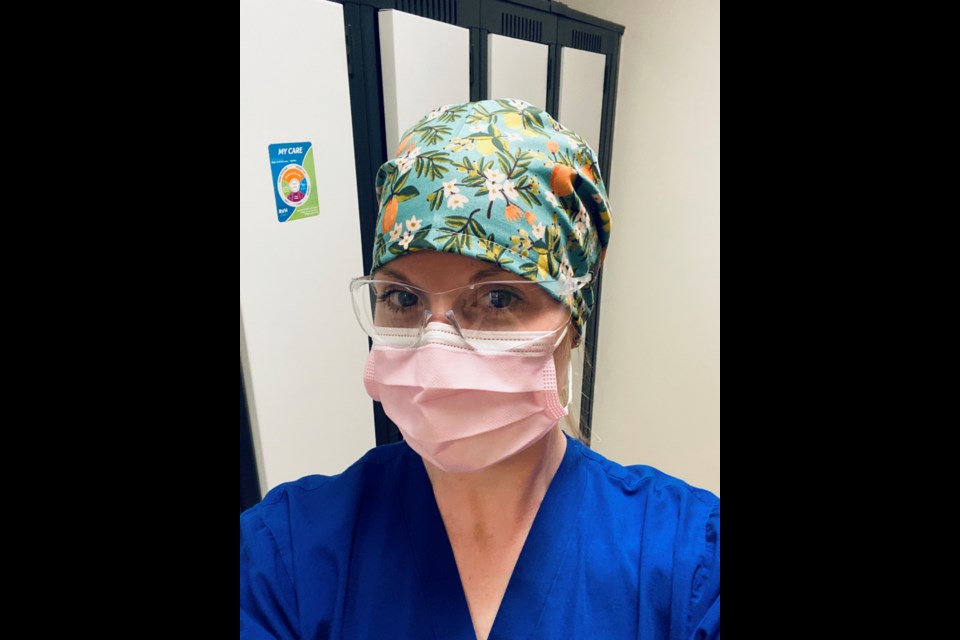Giving birth can be stressful enough without the added difficulties of trying to deliver during a global pandemic.
Local midwife and doula groups have changed some of their policies and procedures in the wake of COVID-19 to adapt to the changing landscape of health care, while trying to soothe the concerns of soon-to-be parents.
“I think there is a sense of fear, but it’s helpful for people to know what steps are in place to protect them whether they’re in the clinic, homes or the hospital,” said Ami Nunn, midwife and partner at Barrie Midwives.
Currently, women in labour who go to hospital to give birth are given masks, which are worn at all times unless they are in their private room.
Barrie Midwives offer care in clinic, hospital and home settings. Masks, scrubs, eye protection are now required and are changed out every time a midwife moves from one setting to another.
All equipment and surfaces are wiped down with disinfectant before entering a space and after leaving a space. The extra steps and precautions for midwives have made processes more challenging, according to Nunn.
“We’re also wearing the full PPE (personal protective equipment) when we’re going into people’s homes. Even going from one appointment to another isn’t really seamless anymore. We’ve all had to get into a groove. If you’re wearing full gowns, you put it on on the front porch, and strip down on the front porch,” said Nunn. “It can be a lot to remember when you’re not staying in one setting. We’ve put a lot of protocols in place.”
Nunn says her practice is normally booked solid and during the COVID-19 pandemic is no exception.
A major change, she says, is that typically moms-to-be she sees through the practice are split between choosing to have their babies in hospital versus at home.
“The change we’re seeing is we’re anticipating more home births,” she said. “Where we’ll really see a major difference is if we see a second wave (of COVID) in the fall. Right now, we’re having a lot of clients book in and are saying they’re undecided. They’re kind of waiting to see what happens with the pandemic.”
Virtual postpartum and prenatal appointments are also now becoming more common.
“I’ve even done breastfeeding support over Skype, which is quite interesting,” she said with a laugh. “We’re definitely getting more creative in that way.”
Personally, Nunn says she’s put some precautions in place as well. Currently, she’s living in a trailer so she can make sure to keep her own family safe.
“It’s a very vulnerable feeling, going into people’s homes. You can control what you wear and bring in, but it is an unknown variable being in the community right now,” she said. “I think there is a sense of fear in health care right now, and it’s a fear of the unknown. It’s still not quite known what we’re battling.”
“There’s already so many unknowns with pregnancy, birth and postpartum. It’s difficult when all we can say is what we know right now is they are safe. It’s very different care right now than what we’re used to providing,” she added.
Nunn says her group has had many much needed PPE donations from local businesses and local seamstresses, including a donation of face shields and masks by Knix and cloth mask and scrub caps from Homemade Masks for Hometown Heroes.
“Hospitals are the priority right now, as they should be, but we also need the equipment to protect ourselves,” she said. “Donations have been incredible.”
Currently, local midwives are in need of homemade gowns.
For downloadable patterns for gowns approved by Ontario Midwives and a YouTube tutorial, click here.
Melissa Cowl and Debra Bowser, doulas and co-founders of The Doula Group in Barrie, have also seen changes in their practice in the advent of COVID-19.
Doulas offer support during the birthing process. They attend births alongside a midwife or an obstetrician and are hired by the family as support staff.
“If things go a little sideways during labour, or off-kilter, we’ve got you,” said Bowser.
Right now, The Doula Group is providing all services virtually, as they were not deemed an essential service by the provincial government.
“We provide physical support, emotional support, informational support or mediation,” said Cowl.
Cowl says some of the concerns local doulas are hearing from women are they’ll have to give birth alone as well as worries about their own health.
“Going forward, there may be a lot of trauma related to birthing from March, April and May particularly. People may be scared to have second babies or move forward. There could be more anxiety issues, mental health issues,” said Cowl. “There are so many risk factors already for postpartum parents, that we’re upping the ante by not having the kind of care we need (available).”
“We’ve had a few inquiries from people who are now more afraid while preparing for their labour,” said Bowser. “We’re seeing the fear is there.”
For more information on The Doula Group, click here.



